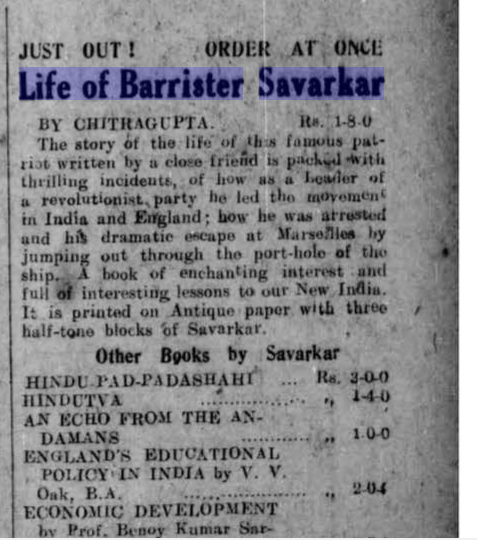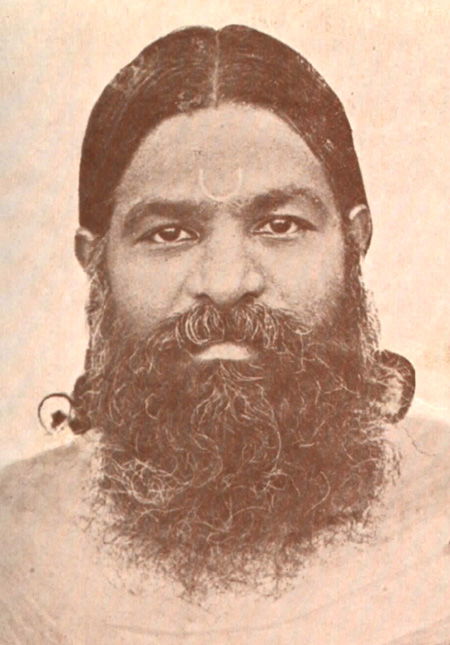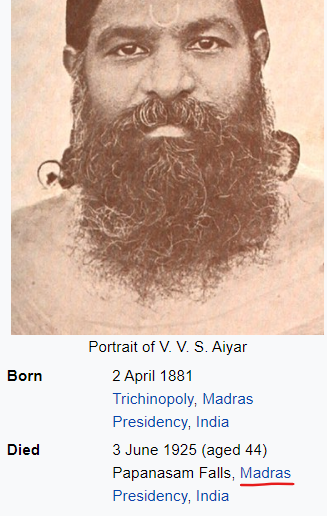No, Life of Barrister Savarkar was not written by Savarkar himself


A wave of False propaganda was started by one of the writers of The Wire guild, Pavan Kulkarni back in 2017, that it was Savarkar who wrote an autobiography glorifying himself.

Misleading and misrepresentation of Savarkar’s image have been going on for centuries. Be it the Congress or the left, none of them backed down from taking a jab on him. We saw a flood of left media claiming that Savarkar wrote himself a biography and promoted himself to look good. Many videos were made in this regard which promoted the same. This was all happening on the revolutionary’s death anniversary last week. Even though Savarkar disliked autobiographies, the left doesn’t seem to stop.
While it is nice to describe a beautiful rose in full bloom, it would be incomplete without a description of everything—right from its roots, the stem, the manure and nutrients that have sustained it, the fresh and dried leaves as also the thorns, in order to conceptualize the beauty of that rose in all its dimensions. Likewise, for a human being’s biography, he needs to be presented ‘as is’ and not ‘as should be’—from head to toe, nothing more, nothing less, as transparent and true to reality as one can be. Everything that can be said or unsaid, that is embarrassing or praiseworthy has to be documented without inhibitions and fears. Of course given the social and political situation that I am writing these in, despite my will, some of the details are being suppressed a little. Also, it would be a breach of trust to reveal confidential details of renowned people whom I have had the good fortune of meeting and interacting with closely in my life. Still, I hold a promise that I have revealed all that needs to be revealed, with the least of colours and bias from my side.
Savarkar in his memoirs
The Narrative states that there was a biography written by Savarkar himself. This was the case with ‘Life of Barrister Savarkar‘ which was written by a mysterious Chitragupta. The claim that it was written by Savarkar himself comes from the second publisher of the book, Dr. Ravindra Ramdas. However, no such supporting references were provided by Ramdas which supports his statement. It was definitely a very unusual statement to make 60 years after it was originally published.
“There have been various allusions about
Vikram Sampath, Savarkar: Echoes from a Forgotten Past
who the author is—from Congress leader C. Rajagopalachari, the
revolutionary V.V.S. Aiyar to Savarkar himself writing under a pseudonym.
The identity of the author continues to remain a mystery. The book
chronicles the stormy years that he spent in London till he was arrested and
sent back to India.”
The name Chitra Gupta means the registrar of the god of death Yama. However, upon digging deeper we do find some colonial textbooks to have some reference to this matter.
First, we gonna take a look at a book called “Banned Controversial Literature And Political Control In British India 1907-1947” by N. Gerald Barrier. The book was banned instantly by the British following year it was published.

Next, We then found an Advertisement for the following book in the Bombay Chronicles of July 1927. The ad was asking people to order the book. Now upon reading the ad carefully you gonna come across the term, The story of the life of this famous patriot written by a close friend…

“The story of the life of this famous patriot written by a close friend and is packed with thrilling details incidents of how as a leader of a revolutionist party he had led the movement in India and England; how he was arrested and his dramatic escape at Maasai by jumping out through the porthole of the ship. A book of enchanting interest and full of interesting lessons to our new India”
The ad in this newspaper clearly states that the Life of Barrister Savarkar was not the work of Savarkar himself but rather one of his associates. The ad was published by B.G Paul and Co, who had an extensive publishing service in Madras, from books related to religion and philosophy they covered many genres. Since Savarkar was not allowed to leave Ratnagiri because of his house arrest. It was totally impossible for him to get a book published that far away. So who was his close friend who could have been in madras?
The only person who come to mind was this man called VVS Aiyer. We are almost sure that he was the real Chitragupta.

VVS Aiyer, who was his comrade in London was a very erudite man who had actually worked on Savarkar’s book before. Aiyer translated Savarkar’s book on the 1857 War of Independence from Marathi to English in London.
After the execution of revolutionary, Madan Lal Dhingra, All the revolutionaries who were staying in India house spread away to Europe. After the capture of Aiyer, he had moved back to India & kept operating between Madras & Pondicherry & had ties with Subramanya Bharati.
In that biography book, there is so much focus on the London/Paris days the impression was that Aiyar who was proficient in English was the one who wrote the book. The book does not have too many details about the early childhood of Savarkar, in fact, it’s particularly focused on his stay abroad. Savarkar was in Paris after Dhingra’s execution when he tried to run away but then he felt very guilty for doing so while his compatriots were being hanged and all that and he comes back to London, where he gets arrested.

Why didn’t the author reveal his name after Independence? Because VVS Aiyer died in Madras in 1925.
The book was originally set to release in 1925 but was delayed to 1927 due to a ban on it in 1926 as mentioned in “Banned Controversial Literature And Political Control In British India 1907-1947“ by N. Gerald Barrier.

Vikram Sampath found in Maharastra Archives that on the 27th of June 1937 there was this Marathi newspaper called Lokmanya in which when Savarkar was released he was addressed by a lot of people, this includes SC Bose too in which he wished that Barrister Savarkar joins the Congress. However, there is a curious case of C. Rajagopalachari, a leader from Congress.
C. Rajagopalachari writes in his memoirs in Marathi,
गतकाळातील बॅरिस्टर सावरकर यांच्या कार्याच्या व संघटन चातुर्याचा माझ्यावर झालेला परिणाम केव्हाही नाहीसा होणे शक्य नाही. मग सध्या त्यांची विचारसरणी व कृती काहीही असो! माझ्यासाठी ते पूर्वीचे तेजस्वी स्वातंत्र्यवीर आहेत. मी वीस वर्षांपूर्वी त्यांचे चरित्र लिहून प्रसिद्ध केले त्यात आता कोणती नवीन भर घालू शकणार आहे? दहा वर्षांच्या दीर्घकालीन विचाराने, मनन-चिंतन आणि अभ्यासाने बॅरिस्टर सावरकर यांचे बौद्धिक प्रगल्भत्व वाढले असले पाहिजे
“The organizational abilities & work of Barrister Savarkar have undoubtedly had a profound impact on me in the past. He remains a heroic freedom fighter for me. What can I now add to a biography of his I penned nearly 20 yrs ago because since then of his intellectual prowess. Must have only deepened by his prolonged introspection during his extended internment”
Note that C. Rajagopalachari claims that he had penned down a biography of Savarkar.
Question. Why did the original author use a pen name for publishing a book? Why didn’t he just use his own name?
To understand this, we must first know that Savarkar was conditionally released from prison in 1924. He had to follow these conditions at any cost for the next five years otherwise he would be arrested again and this time, he will have to spend a total of 25 more years of his life at Kala Paani prison in the Andamans.
The conditions for his release were-
1) The said Vinayak Damodar Savarkar will reside within the territories administered by the Governor of Bombay in Council and within the Ratnagiri District within the said territories, and will not go beyond the limits of that district without the permission of Government or in case of urgency, of the District Magistrate.
2) He will not engage publicly or privately in any manner of political activities without the consent of the Government for a period of five years, such restriction being renewable at the discretion of the Government at the expiry of the said term.
Savarkar clearly understood the repercussions of his failure to adhere to the above conditions of his release. As he noted in his book My Transporation for life: ‘Should I fail to fulfill those conditions or any portion of them . . . I may be arrested by any police officer without a warrant, and remanded to undergo the unexpired portion of my original sentences.’ 4 If he committed offenses that would warrant his remand, he would have to serve yet another term of imprisonment for at least twenty-five years!
As part of the deal, Savarkar signed a declaration that went completely contrary to his conviction. Yet, he signed it because he believed he was of more use to the country being outside rather than inside the jail. (Source: Savarkar A contested legacy by Vikram Sampath)
Now, it is pretty apparent why the original author used a pen name instead of his real name. The claim by the new current publishing house provides no such source or evidence. The lie spread by the left journal house like The Wire has got so worse than it is now cited on his Wikipedia page. How are they refuting real written evidence from Maharastrain Archive and supporting more vocal gossips which have no authenticity at all is shocking.
DISCLAIMER: The author is solely responsible for the views expressed in this article. The author carries the responsibility for citing and/or licensing of images utilized within the text.
4 Comments
You must be logged in to post a comment.

I am not supporting leftist views here. But I have a question. If the book is not published by Savarkar but from someone close to him, why didn’t he disclose his name after the independence? What was so secretive about it? That creates doubt. I am sure during that time as well, this question must have raised. Now, if the book was really written by any of his admirers, to clear the name of Savarkar, the person would have disclosed his name after independence. Isn’t it?
Even if the name was hidden from British government, it must have been known to Savarkar, his close associates and many of his followers. Then, why nobody disclosed it?
Hi, Thank you for the comment. We are almost sure that the book was written by VVS Aiyer. The book was published in Madras, it is the place where VVS Aiyer died. VVS Aiyer was a major companion of Savarkar during his stay in London and the Life of Barrister Savarkar is mostly all about Savarkar’s life in England and barely mentions other events such as his childhood.
Now, Why didn’t he disclose his name after the independence? VVS Aiyer died before this book was published. Moreover, He used a secretive name such as Chitragupta because VVS Aiyer was a fugitive due to his involvement in the Armed struggle and was wanted by the British.
it is written in the preface of ‘life of barrister savarkar – second edition’ that chitragupta is none other than savarkar himself…check the book please and delete this article
it is written in the preface of ‘life of barrister savarkar – second edition’ that chitragupta is none other than savarkar himseld…check the book please and delete this article